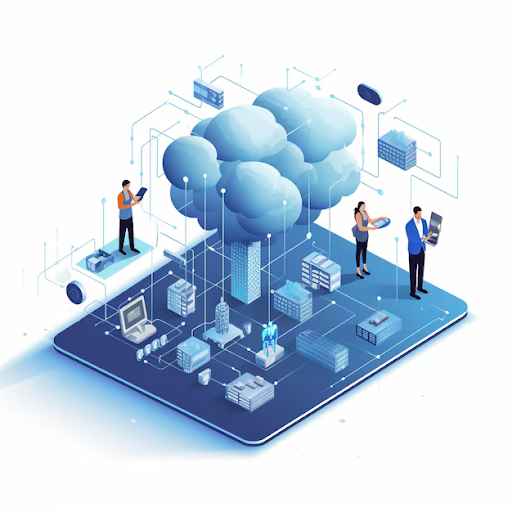In the digital age, the application of information technology in business management is inevitable. Cloud ERP is not just a trend but also an essential solution to help businesses adapt to the rapid changes in the market. However, implementing Cloud ERP requires thorough preparation and the cooperation of all employees.
This article will help you better understand Cloud ERP and make the right decision for your business.
1. Introduction to Cloud ERP

Cloud ERP (Enterprise Resource Planning on the cloud) is an ERP software system deployed on a cloud platform, allowing businesses to efficiently manage daily activities such as accounting, sales, human resources, production, and warehousing. Instead of installing ERP software on on-premise servers, Cloud ERP stores data and operates on remote servers managed by cloud service providers.
Cloud ERP has become the preferred choice for many businesses due to its flexibility, scalability, and lower implementation costs compared to traditional ERP. The popular cloud ERP systems today include Odoo Online, Oracle Cloud ERP, SAP S/4HANA Cloud, and Microsoft Dynamics 365.
For more information: What is ERP?
2. Outstanding advantages of Cloud ERP
Saving on initial investment costs
When using Cloud ERP, businesses do not need to invest a large amount in purchasing servers, software, or paying for system installation and maintenance costs. Instead, you only need to pay a monthly or annual subscription fee to the service provider. This helps minimize financial risks and is more flexible in budget management.
Flexible and scalable
Cloud ERP easily adjusts the system's scale according to the business's needs, without being limited by server configuration. When the business scales up, you can easily upgrade the resources of Cloud ERP to meet the needs of larger data processing, increased number of users, and more complex business processes. Conversely, when a business downsizes, you can also adjust resources flexibly to save costs.
Continuous updates
Cloud ERP providers frequently update new features, such as integration with artificial intelligence (AI) tools to enhance operational efficiency, or advanced security features to protect business data. Using the latest software version helps businesses leverage the newest technologies and improve work efficiency.
Integration with other applications
Thanks to its integration capabilities, businesses can build a complete information technology ecosystem, enabling departments within the company to work more efficiently and exchange information seamlessly.
For example, Cloud ERP can easily integrate with other applications such as CRM, SCM, and e-commerce platforms, helping businesses comprehensively manage their operations.
Security
Cloud ERP service providers often implement high-security measures to protect customer data, especially in an era where cyberattacks are becoming increasingly complex. Cloud ERP providers often invest heavily in security solutions, including data encryption, multi-factor authentication, and intrusion prevention mechanisms.
Accessibility from anywhere
With Cloud ERP, users can access the system from anywhere, as long as they have an internet connection. This is particularly useful for businesses with remote employees, branches, or sales teams that frequently move around. Remote access enhances the productivity and efficiency of the workforce.
3. Key features of Cloud ERP

Cloud ERP, or Enterprise Resource Planning system on the cloud platform, offers a range of features that help businesses manage and operate their activities efficiently. Here are some key features and benefits that Cloud ERP offers:
Financial management
- Accounting: Managing accounting books, invoices, documents, financial reports.
- Banking: Managing bank accounts, reconciling data.
- Budgeting: Financial planning, revenue and expense forecasting.
- Inventory management: Monitoring inventory, managing stock in and out, warehouse management.
- Purchasing management: Managing purchase orders, comparing prices, selecting suppliers.
- Sales management: Managing sales orders, creating invoices, tracking customer debts.
Production management
- Production planning: Create production plans, monitor production progress.
- Quality management: Managing product quality, monitoring production defects.
- Maintenance management: Managing the maintenance of equipment and machinery.
Human resource management
- Employee management: Managing employee information, attendance tracking, payroll calculation.
- Recruitment management: Managing the recruitment and training processes.
- Employee evaluation management: Evaluating the work performance of employees.
Customer management
- Customer information management: Storing customer information, transaction history.
- Interaction management: Managing interactions with customers (email, phone, chat).
- Marketing: Supporting marketing activities such as marketing campaigns and customer care.
4. Benefits of implementing Cloud ERP
Automating processes
Tasks such as data entry, report generation, data reconciliation, etc., can be fully or partially automated, allowing employees to focus on higher-value work. The processes are carried out more quickly and accurately, helping to shorten the transaction processing time. Thanks to automation, businesses can use human resources more efficiently.
Improve data quality
Cloud ERP centralizes all of a company's data into a unified system, eliminating the issue of data being scattered across multiple spreadsheets and different software. All departments in the enterprise can access and share information quickly and accurately. If there are any errors, the system automatically checks and detects input errors, records the history of data changes, making it easy to track and retrieve information.
In addition, Cloud ERP provides powerful reporting and data analysis tools, helping businesses maximize the value of their data. Based on the analytical reports, businesses can make data-driven decisions scientifically.
Quickly adopting new technology
Quickly accessing new technology is one of the most prominent benefits when businesses implement Cloud ERP. Thanks to the cloud computing model, businesses can easily access and leverage the latest technologies such as artificial intelligence (AI), big data analytics, and the Internet of Things. (IoT),...helps optimize operational processes, enhance business efficiency, and strengthen competitive advantage.
Cost optimization
By minimizing initial costs, operational costs, and increasing operational efficiency, Cloud ERP helps businesses save a significant amount of money. Specific example
Retail industry: Cloud ERP helps optimize inventory management, reducing excess or insufficient stock.
Manufacturing industry: Cloud ERP helps plan production efficiently, reducing production costs.
Customize the software according to needs
Most Cloud ERP systems allow users to configure basic settings such as currency, language, report types, etc.For more complex needs, businesses can request the provider to develop custom modules to meet specific requirements. Cloud ERP can be integrated with existing business systems such as CRM and SCM, helping to create a complete information technology ecosystem.
5. The challenges when implementing Cloud ERP
Dependence on Internet Connection
Cloud ERP requires a continuous internet connection to operate, so when there is a network outage, users will not be able to access the system. This requires businesses to have a stable internet connection and backup measures in case of network issues.
Concerns about data security
Although Cloud ERP providers always have security measures in place, storing important business data on remote servers can increase concerns about information security risks. Businesses often worry about sensitive data being accessed without authorization or being lost.
The ability to integrate with existing systems
Cloud ERP can face difficulties in integrating with the software and internal systems that the business has previously used. This requires a thorough integration and customization process to ensure that the Cloud ERP operates seamlessly with the company's current system.
Dependent on the vendor
When businesses use Cloud ERP, they depend on the provider for security, upgrades, and system maintenance. If the provider encounters security issues or fails to ensure service quality, the business will face risks affecting its operations.
6. Note when implementing Cloud ERP

Criteria for selecting a reputable provider
The success of the ERP implementation and customization process heavily depends on the choice of solution provider partner. For businesses with specialized processes, finding a unit with experience and the capability to implement complex projects is extremely important. This unit needs to understand the challenges the business is facing and provide appropriate solutions to address the issues.
Building an implementation roadmap
Implementing ERP is not just about selecting and installing software. Businesses need to have a comprehensive view of the entire process, from evaluating the current procedures, detailed planning, budget allocation, to selecting the most suitable implementation timing. A comprehensive implementation plan will help minimize risks and ensure the success of the project.
Training employees on how to use the software.
People are the core factor in the ERP implementation process. Businesses need to thoroughly assess employee readiness, from training and capacity building to changing work habits. In addition, building an effective communication plan is also very important to ensure the participation and support of all employees.
Risk management, ensuring data security
Data security is one of the biggest challenges when implementing Cloud ERP. To ensure information security, businesses need to thoroughly understand the certifications and security standards achieved by the provider, as well as the technical security measures they implement. In addition, reviewing security policies, incident response procedures, and customer support mechanisms is also essential.
7. Comparison of Cloud ERP and Traditional ERP
Cloud ERP and traditional ERP (on-premise) are two different forms of enterprise resource planning system deployment, each with its own advantages and disadvantages. To help you better understand the differences between these two forms, let's compare them in detail:
Deployment model
- Cloud ERP: Deployed on a cloud computing platform, users access the system through a web browser.
- Traditional ERP: Installed and run on the company's own servers.
Cost
Cloud ERP: The initial cost is lower, only requiring a monthly subscription fee. Operating costs are also flexible, depending on the scale of use.
Traditional ERP: The initial costs are higher, including the costs of purchasing software, servers, networking equipment, and personnel costs for installation and maintenance. Operating costs are also higher due to the need to pay for system maintenance and software upgrades.
Scalability
Cloud ERP: Easily scale the system to meet growing business demands.
Traditional ERP: Scaling up requires additional investment in hardware and software, which is costly and time-consuming.
Maintenance and updates
Cloud ERP: The service provider will be responsible for software maintenance and updates. Users do not need to worry about technical issues.
Traditional ERP: Businesses must manage software maintenance and updates themselves, requiring a specialized IT team.
Flexibility
Cloud ERP: More flexible in usage, accessible from any device with an internet connection.
Traditional ERP: Lower flexibility, dependent on the software installation location.
Security
Cloud ERP: Cloud ERP service providers often implement high-security measures to protect customer data.
Traditional ERP: Businesses must ensure the safety of their data themselves, requiring investment in security solutions.
8. Conclusion
Cloud ERP is not merely an enterprise management software; it is also a comprehensive solution that helps businesses optimize their operational processes, enhance efficiency, and improve competitiveness. However, to fully leverage the potential of Cloud ERP, businesses need to choose a reputable provider and have an appropriate implementation plan. If you are looking for a solution to modernize your business, please contact us for the most comprehensive consultation.